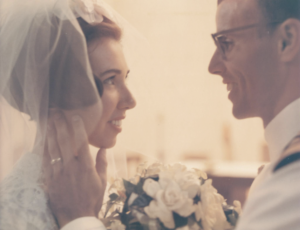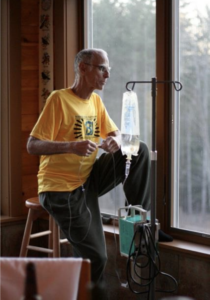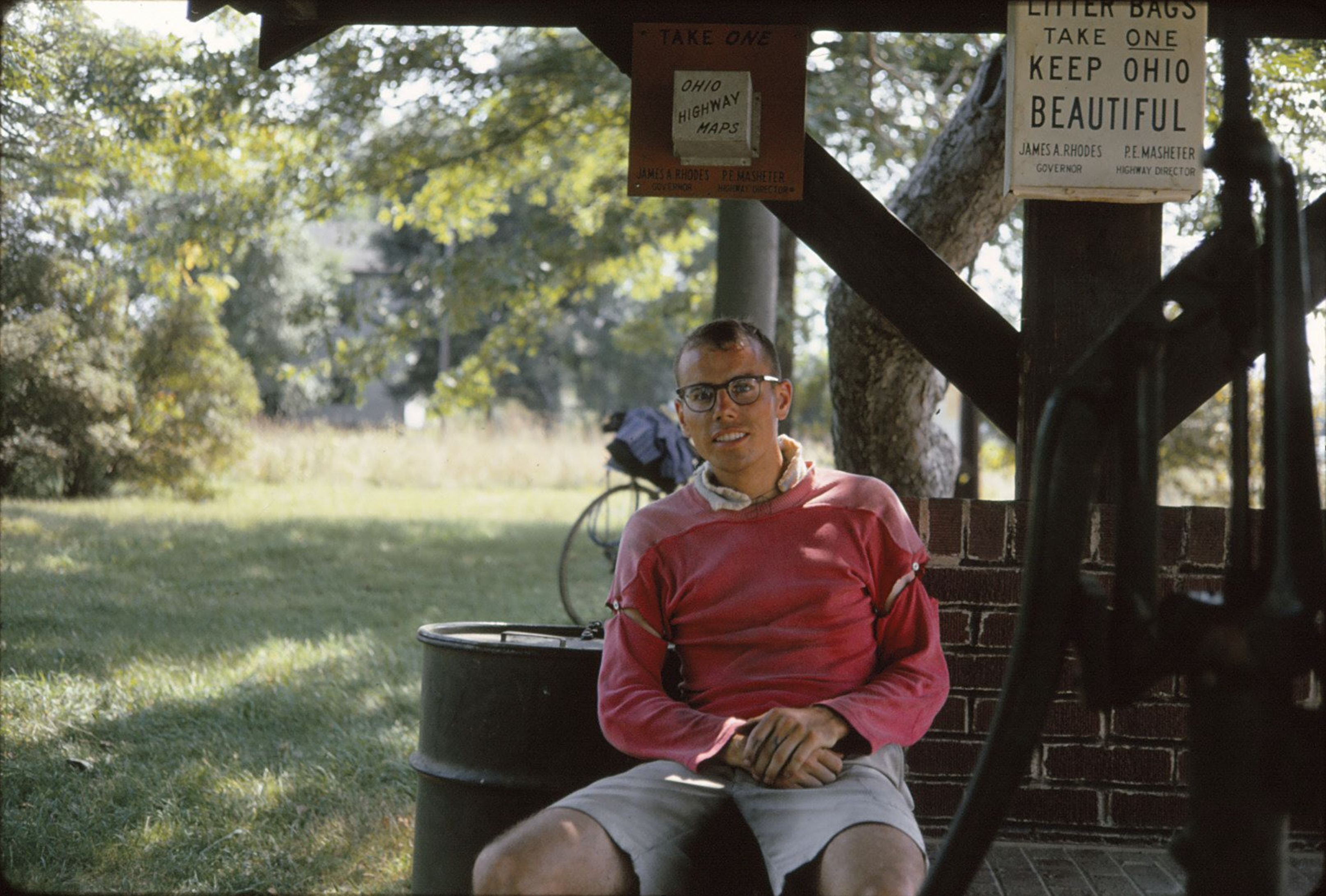An interview with Sr. Mariae Agnus Dei, SV
God never stops running after us with his love. This is the story of someone whom God pursued to the end. This is a story of a man who ran to win and found the ultimate victory in the gift of faith, the grace of redemption, and the freedom of a son of God the Father. This is the story of my dad, Dr. William T. Yates.
Can you tell us about your parents? How did they meet? He was a Navy doctor and self-proclaimed “humanistic existential agnostic,” ready to pioneer his own path and believe what experience revealed. She was a Navy nurse and cradle Catholic, waiting for an adventure. He wheeled in a new patient to her unit and glibly told her to give the patient some Aspirin. She, a dutiful nurse, politely demanded, “And who is ordering this?” Rather than an affront, he saw this as a golden opportunity. He answered with a smile, “I am.” Cutting through the attempt at charm, she replied, “And who are you?” Undeterred, his smile broadened even more as he asserted, “The doctor.” While it may not have been love at first sight, it was definitely a first spark. Eight months later, they were married and began a 43 year adventure in love, faith, and family. You said your dad was always seeking to discover truth through his experience.

Was there a particular moment that sparked his conversion to the Catholic faith? I remember driving home from an afternoon hike with my dad when I was a senior in high school. He had worked as a doctor in obstetrics and gynecology (OB/GYN) at that point for over thirty years, and was musing about his experience. At some point in the conversation, I found myself asking if he had ever performed abortions. He answered, “Yes.” I swallowed hard. “How many?” “At least a dozen in residency…” he answered. “Something happened, though, that made me stop. After performing an abortion one day, I went out to tell the sister of the patient that the surgery was over. Before I could walk away, the sister asked me, ‘Was it alive?’ I didn’t know how to respond to her. I knew that if I said ‘no’, I would be lying, and if I said ‘yes’, I had just killed someone. That was the last abortion I ever performed.” This experience confronted him with the reality that there was truth, and that the truth mattered. It drew him into deeper discernment about the decisions he made, and why he made them. Ultimately, it provoked a deeper honesty with questions of both life and faith, and was the spark that led him down the road towards conversion.
How did he come deeper into the Catholic faith? Was your mom a part of his faith journey? Growing up, I remember my parents often engaging in deep conversation. They both had strong personalities and helped each other ask hard questions. They were a good match for each other. My mom had a deep reverence for the sacredness of life and loved her faith. My dad was his own man, but on an honest search for truth. While someone who lived all things with great energy and innovation, he also loved the turtle’s approach to life: “Slow and steady wins the race,” he would say. This was especially true when it came to his faith journey. One day, 18 years into the marriage, my dad told my mom he was going to enter the Catholic Church. He had signed up for RCIA (Rite of Christian Initiation of Adults) classes on his own initiative. She was shocked. While she had prayed for it, it was never something she pushed. Years later, I asked him why he converted. He said, “I wanted a place to stand in life, and I knew the Catholic faith was the most true.”
How did his conversion affect his profession as a physician? Three years after entering the Church, my father decided he wanted more training in his field. He moved our family of ten from Maine to Nebraska to begin a year-long fellowship at the Paul VI Institute in Fertility Care and NaPro Technology. My mother also trained to become certified in Natural Family Planning. It was a big move that came as a surprise to many — fellow doctors, family … even the IRS investigated him because such a drastic drop in income with so many dependents just didn’t make sense. We returned to Maine a year later, and my parents worked side-by-side in my father’s practice, offering women’s healthcare in line with the teachings of the faith. While a first courageous step in bringing faith into his professional life, he still grappled with many questions of his new faith, especially when not just one, but two of his daughters (Sr. Mary Louise Concepta and I), entered the convent.
What happened when he received his diagnosis of cancer? His faith was drawn into new depths when he faced a diagnosis of terminal cancer shortly after retirement. It came as a shock to all of us. He was a life-long runner and hiker. He put olive oil on his toast every morning. To celebrate his retirement, he biked from St. Louis to Maine. He was the last person you would expect to get cancer. One day, he noticed his eyes were a bit yellow. Two days later, he had emergency surgery. A week later, he was diagnosed. Four short months after that, he passed away. While these were some of the most difficult days we ever faced as a family, they were also some of the most beautiful.
How did you live this time of illness together as a family? My dad had been a runner his whole life and shared this passion with all of us. He was always at our races ready to coach and cheer us on. In a way, we all came to look at this diagnosis as his last race. He was going to run it, and run it well. And we were going to run it with him, all the way to the end. Our first weeks adjusting to the realities of the diagnosis were tough. My father had always successfully overcome challenges in life through hard work and self-reliance. We quickly learned the vulnerabilities brought about by the cancer would require a different approach, as attempts to control the situation were only giving way to frustration and anger. We were going to have to learn a new way.
How did your father approach his illness? Dad decided to go for a huge surgery, hopeful to buy more time. Two hours after he went in, we got a call. The surgeon told us what we feared most, “The cancer is everywhere; there is nothing we can do. We are closing him back up.” We immediately called the Sisters of Life to pray. This news was going to be crushing. We went to the recovery area to be with him. As he came to, the surgeon gave him the update, “Sorry, Dr. Yates — the cancer is everywhere. There is nothing we can do.” My dad looked at him, peaceful as a lamb, and said, “That’s ok. Thank you, doctor.” The surgeon was concerned my dad wasn’t getting the point, and said, “No, it’s not ok. It really stinks.” But my father was now looking at my mom, my sister, and I, and said with a meekness I had never before seen in him, “It’s God’s will. I’m sorry. I tried.” We had prayed for a miracle of healing, and we knew in that moment that we had got one — not one physical, but spiritual. My father’s heart was filled with a new and radiant faith. He was going to live this illness with hope in God and in love for us. And that is exactly what he did.
How did you see the power of love at work? At the outset, we were confident we had the strength and skills to manage a journey with terminal cancer — just in our immediate family, we had two doctors, three nurses, two public health masters, a financial advisor, a marine, and two nuns. Well, we quickly learned we were wrong. There was one power alone that was going to hold us through the ups and downs, the unknowns, the riddle of suffering — and that was the power of love. We all took turns being with Dad in a relay of support. Every day we lost ground. Every day he got sicker. Every day evoked varying degrees of helplessness and heartbreak as we watched someone we loved so much suffer. And yet, as we held onto love, a profound hope and peace held us. Every moment took on new depth and meaning. Reconciliation and healing poured like oil over our hearts. With everything stripped away but the task of love, we gathered together as a family in new unity and grace.
 How were you, personally, affected by these days of your dad’s illness? I think one moment really illustrates it. My father had always cared well and creatively for our home. He had big gardens that yielded everything from tomatoes to rhubarb; he developed various systems to cleverly protect the wear of the house; he built what was needed for fun as we grew — a tree house, a giant swing … whatever we could dream up, he loved trying to invent. But, because of his illness, the lawn had become a jungle, so, one beautiful fall day, when I was at home caring for him, I decided to rev up the old lawn mower. Before too many steps, I had tears rolling down my face and joy flooding my heart. As a kid, mowing the lawn was a chore I did out of fear of punishment. As I got older, I did it for money. Now, as I mowed the lawn, every motivation of my heart gave way to deep love for my father. I glanced up towards the house and saw my dad in the bay windows, watching me. Throughout the years, our relationship had its struggles. This, however, was one of those special moments when all that fell away. Our hearts freely rested in the peace between us and the treasured gift we had in each other. We were discovering together the profound gift of living not in our own strength, but in the Father’s Love. We were learning this was a love more powerful than anything. In it, we found the peace of placing our full trust in the Risen Savior, the beautiful potential of vulnerability and suffering to open our hearts to love and communion, and the freedom and strength to be found depending on the Father for everything. I watched my dad learn a new way to live, and, in effect, I did too.
How were you, personally, affected by these days of your dad’s illness? I think one moment really illustrates it. My father had always cared well and creatively for our home. He had big gardens that yielded everything from tomatoes to rhubarb; he developed various systems to cleverly protect the wear of the house; he built what was needed for fun as we grew — a tree house, a giant swing … whatever we could dream up, he loved trying to invent. But, because of his illness, the lawn had become a jungle, so, one beautiful fall day, when I was at home caring for him, I decided to rev up the old lawn mower. Before too many steps, I had tears rolling down my face and joy flooding my heart. As a kid, mowing the lawn was a chore I did out of fear of punishment. As I got older, I did it for money. Now, as I mowed the lawn, every motivation of my heart gave way to deep love for my father. I glanced up towards the house and saw my dad in the bay windows, watching me. Throughout the years, our relationship had its struggles. This, however, was one of those special moments when all that fell away. Our hearts freely rested in the peace between us and the treasured gift we had in each other. We were discovering together the profound gift of living not in our own strength, but in the Father’s Love. We were learning this was a love more powerful than anything. In it, we found the peace of placing our full trust in the Risen Savior, the beautiful potential of vulnerability and suffering to open our hearts to love and communion, and the freedom and strength to be found depending on the Father for everything. I watched my dad learn a new way to live, and, in effect, I did too.
What were the last days of your father’s life like? My father moved into the active dying stages on Christmas Day. The whole family gathered and took turns keeping vigil with him. Meanwhile, throughout the house, his grandchildren played gleefully, and the rest of us went to work bringing to life all the familiar tastes and traditions of Christmas. It was a time of such deep contrasts: life and death, joy and sorrow, gratitude and grief.
When the priest came to anoint Dad, my brother-in-law mentioned in passing how they had postponed getting their baby baptized because of everything happening with my dad’s sickness. “Why don’t we just baptize him at your dad’s bedside today?” offered the priest. Preparations were made, and everyone rallied for one last family event. Of course, Mom had saved everyone’s baptismal candles. They were lit and distributed. My father also rallied. Though weak and barely conscious, he participated as best he could in each part of the rite. He tried to bless himself, dutifully mouthed the words of the Our Father, and when it came time to renew our baptismal promises — “Do you reject Satan?… Do you believe in God?… etc.” he raised what voice he had left to proclaim his faith one last time: “I do.” The spiritual battles of the years and those of his last days were laid to rest. A new peace filled my father’s heart. He was ready.
Just a day later, Dad’s breathing changed, and we knew it was time. Mom, all of us eight kids, and a number of grandchildren gathered around his bed. At first, it was silent. I wondered if I had the courage to stay with Dad in this final stretch and love him through to the finish line. My heart was broken in that moment by two great loves — the love of a daughter for her father that wanted to hold on to the gift, and conversely, a love desiring to reverence God the Father calling His son home. I silently prayed. Then I heard the voice of one of my sisters say, “We are all here now, Dad. You can go. The Father is waiting for you.” And then another sister echoed, “You are almost to the finish line, Dad! Just a few more breaths!” And then another sibling, “We love you, Dad! You are almost there!” We all took turns encouraging our father as he ran to cross the finish line.
And as soon as it began, it was over. He breathed his last. He made it. Peace flooded the room, and I immediately felt prompted to ask my mother, “What is the feast day today?” “It’s the feast of the Holy Innocents*,” she replied. Grace pierced my heart. It seemed clear to me that God’s merciful love wanted to have the final word on my father’s life. In His designs, the little ones that my father had once acted against were the very ones to welcome him into eternal life.
* The Holy Innocents were those children whom King Herod killed when he was searching for the Baby Jesus. (cf. Mt 2:16-18) They have been declared saints and martyrs by the Church; their feast day is December 28th.
Note: We kindly ask that this article not be reproduced without permission.
Originally printed in IMPRINT Fall 2020


Thank you for sharing your story here and on Hallow. I also lost my father to cancer and am currently struggling wrapping my faith around my husband’s battle.